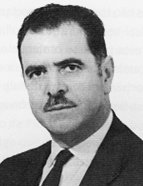

................................
After his initial concern with the democratisation of culture and access to an up-to-date and diversified bibliography – a concern that can be seen in the 1940s and 1950s and especially in his Mobile Library initiative and a series of short works in a collection entitled Cultura e Acção (Culture and Action) – from 1961 on, he devoted himself to historical reflection which he later exteriorised in his essay História e actualidade (History and Actuality). Victor de Sá also contributed to the Annales School, so becoming part of our contemporary historiography. As José Tengarrinha said in a talk in a colloquium in homage to Victor de Sá in 2001, “contrary to official historiography that sought to defend the chastity of Clio and kept the object of study as far removed as possible from present time, thus reducing the historian to a pure erudite … Victor de Sá and the historians of his generation sought to fill this vacuum, this silence of Portuguese historiography”. Thus his focus on the 19th century and Liberalism arose naturally, showing the ability the country had to gain freedom even when faced with the internal and external conditionalities that were moving in a different direction. This focus could already be seen in 1964 when he published Perspectivas do século XIX (Perspectives of the 19th Century) in the Portugália Collection edited by Augusto da Costa Dias. In fact this collection became a cultural reference, not only because of the time when it appeared but especially for the authors whose voices were heard: Alexandre Cabral, Alberto Ferreira, Joel Serrão, César Nogueira, António Borges Coelho and J. S. Silva Dias, in addition to that of the collection’s editor. His work is a reference for the way in which it deals with the first Socialist press in Portugal and how it calls attention to the “1852 Generation” (Amorim Viana, António Pedro Lopes de Mendonça, Sousa Brandão, Custódio José Vieira, among others). In fact, the timeless thoughts of some protagonists always merited his special attention: from Mouzinho da Silveira to António Sérgio, from Ribeiro Sanches to Antero de Quental, he always sought to uncover the role played by principles, ideas and values in historical change. This transversal, evolutionary and cyclical feeling that there are ideas that have been sown and are just waiting for time and space to help fertilise them is well expressed in his work Liberais e Republicanos (Liberals and Republicans) published in 1986. His outstanding A Crise do Liberalismo e as primeiras manifestações das ideias socialistas em Portugal (1820-1852) [The Crisis of Liberalism and the first manifestations of socialist ideas in Portugal (1820-1852)] is the best summary of a whole epistemological and scientific position that he sought to bring to his teaching.
